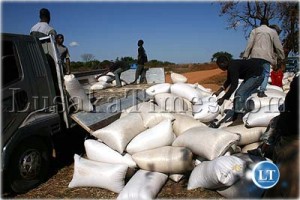
FOOD Reserve Agency (FRA) executive director Anthony Mwanaumo has said the organisation will buy an estimated one million metric tonnes of maize by the end of October.
And Dr Mwanaumo has announced that the agency plans to export maize in order to create space and generate revenue to pay back loans obtained to finance crop purchases.
Dr Mwanaumo said in Lusaka yesterday that so far the FRA has bought 643,000 metrics tonnes of white maize and 837 metric tonnes of paddy rice valued at K859 billion and K1.4 billion respectively.
Dr Mwanaumo said this when he officially opened a crop marketing re-strategising workshop for 2010 at Golfview Hotel in Lusaka yesterday.
He said Zambia has produced a bumper harvest of 2.7 million tonnes of white maize, which has resulted in a maize surplus of one million tonnes countrywide.
“At the current rate of purchases, we estimate that we will purchase up to 700,000 metric tonnes of white maize before the end of September.
We must also be alive to the fact that with such a big crop, the possibility of extending the programme beyond the end of September is highly likely,” Dr Mwanaumo said.
He said, however, that the bumper harvest has brought with it some challenges to the FRA in terms of managing the stock and also created a huge funding deficit to pay farmers as well as run the entire programme.
Dr Mwanaumo said the organisation has started drawing on the loan facility from a syndicate of banks and so far K82 billion has been accessed as of September 2010.
He said the agency has also received additional funding from the government to help clear some outstanding debts with service providers such as transporters, pest controllers and suppliers of marketing requisites.
Dr Mwanaumo appealed to transporters who shunned the programme due to lack of payment to get back to work and help move the maize as their payments are now guaranteed.
“We are expecting additional funding from Government to bridge the funding gap between the loan facility and the total programme budget,” he said.
He said the FRA projects that about K130 billion will be disbursed on a weekly basis for farmers’ payments and other related payments until the end of the programme.
“In other words from now onwards our various paying points will continue to pay farmers until every farmer is paid. The payments to farmers have since commenced. Most areas with smaller balances have since been cleared,” Dr Mwanaumo said.
He said so far K126 billion has been paid to farmers.
Dr Mwanaumo said the FRA has continued to receive serious requests to buy maize for exports and that market opportunities are looking bright.
“This should give hope to our service providers who we owe money as the export programme will help us meet these financial obligations,” he said.
He said plans to export the surplus have also been necessitated by lack of storage space as this year’s programme is unprecedented in the history of the agency.
Dr Mwanaumo said the FRA has 1.3 million metric tonnes storage capacity out of which 40 percent is leased to the private sector and the fertiliser support programme.
“The remainder of the space is not sufficient to store the projected 1 million metric tonnes considering that we have about 160,000 metric tonnes carry-over stocks,” he said.
Meanwhile, CHIMWEMWE MWALE reports that the FRA has started looking for storage facilities to rent across the country for storing grain.
FRA public relations officer Mwamba Siame said in an interview in Lusaka last week that the need for more storage facilities is as a result of more grain that the agency will have to buy and store.
Ms Siame said the storage capacity of infrastructure the FRA intends to rent must range from 500 metric tonnes to 5,000 metric tonnes in rural areas and 3,000 metric tonnes or more in urban areas.
She said the infrastructure must be available for lease for a minimum of one year and must conform to FRA storage facility standards.
“The rent charges are FRA guiding rates of K2,500 per metric tonne per month for sheds in urban areas and K2,000 per metric tonne per month in rural areas. The rates are inclusive of all taxes,” Ms Mwamba said.
[Zambia Daily Mail]








